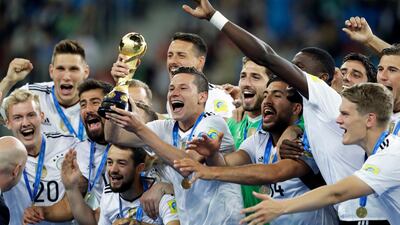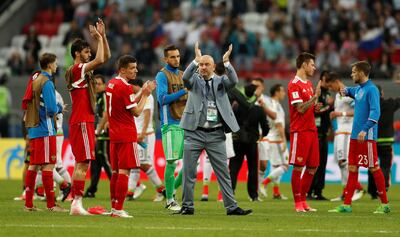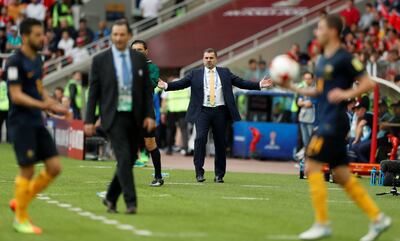SAINT PETERSBURG // The Confederations Cup has long been used as a reconnaissance run, a means of assessing a World Cup host country's preparations for the following year's main event. Yet it is not only the welcoming nation that is able to gain valuable insights into what and where improvements must be made over the home stretch.
With considerably less international focus and pressure than comes with a World Cup, football's global governing body, as well as the eight competing squads, are also able to use the Confeds to gain a better understanding of where they themselves stand ahead of the sport's global showpiece a year later.
VAR must improve or risk spoiling the beautiful game
At the 2013 tournament in Brazil, goal-line technology (GLT) made its first outing at a major international event and helped identify a goalscorer in the third-place play-off. In Russia, a similar technological trial took place, but while GLT was quickly accepted as having improved the game, the same cannot yet be said of video assistant referees (VAR).
Six game-changing decisions were overturned by VAR in Russia and Fifa president Gianni Infantino told reporters "nothing is standing in the way" of the system being used next summer. Yet the technology was criticised throughout the tournament for the time it takes to reach a decision, while fans — unable to see replays inside the stadium or hear the conversations between referee and VAR — complained it is confusing.
More importantly, VAR failed to deliver justice. In the semi-final between Chile and Portugal, Iranian referee Alireza Faghani missed a clear penalty and the VAR did not sufficiently interfere, while in the final a blatant elbow by Gonzalo Jara resulted in only a yellow card, even after referee Milorad Mazic reviewed the incident on the pitch-side monitor.
"So far it has been successful," Infantino said. "Without the VAR, we would have had a different tournament and it would have been a little less fair. Thanks to VAR, we have achieved a great thing.”
While that sounds worryingly blind-sighted, fortunately all involved concede VAR needs more work. The system will likely be used in Italy and Germany's domestic leagues next season, as well as at the Fifa Club World Cup in Abu Dhabi in December, so the opportunities to improve are plentiful - and necessary.
Russia face a fight to improve
The same cannot be said of the Russian national team, whose opportunities to improve between now and June 14 when they kick off Eastern Europe's first World Cup in Moscow are limited to a spattering of friendly matches. As hosts, Russia qualified automatically for next summer's extravaganza and have not played a competitive match since their dismal European Championship campaign last June.
At the Confederations Cup, manager Stanislav Cherchesov named an inexperienced squad shorn of stars and all of whom play in the Russian Premier League. They became the first country in the tournament's history to fail to progress through their group, losing two of their three games and managing to throw away a one-goal lead in their final, must-win match against Mexico.
They will need to develop considerably if they are to avoid joining South Africa as the only hosts to fall at the first hurdle at their own World Cup. Vitaly Mutko, the deputy prime minister and head of the Russian Football Union, however, is tempering expectations. "We won't have new players tomorrow," he said. "This is our main team. Aliens aren't going to fly in to play for Russia."
Cherchesov's next match is against Argentina in November, where he will hope to at least welcome back CSKA Moscow midfielder Alan Dzagoev and the promising Spartak midfielder Roman Zobnin, who damaged his cruciate ligaments two weeks before the start of the tournament.
Africa and Asia appear no closer to a breakthrough tournament
Russia's disappointment in failing to progress can be tempered by the fact that, as hosts, they were the only non-champions taking part. Cameroon and Australia had no such excuse, raising questions again about the strength and growth of their respective regions, Africa and Asia.
It is 40 years since Pele famously predicted a side from Africa would win the World Cup, but it still looks no closer to becoming reality. Never has an African team progressed further than the quarter-finals at a World Cup, while still no side from the continent has managed to get out of their group at the Confederations Cup. Cameroon, for all their pace and potential, were outplayed by Chile and Germany and, despite taking the lead, failed to beat Australia — who themselves failed to win a match in Russia.
Australia's exit means no representative of Asia has reached the final four at a Confeds Cup since 1999, although the Socceroos admittedly did make it to the semis while representing Oceania in 2001. South Korea made it to the last four at their World Cup on home soil a year later, but there are few signs that any Asian team is ready to kick on. In 2014, all four representatives were eliminated at the group stages.
Germany's frighteningly deep bank of reserves
Compare that to Germany's recent record at major finals and the contrast is almost as black and white as a national team shirt. The world champions have made it to the final at five of the past seven World Cups and will be favourites next summer after triumphing in Russia with an inexperienced squad and no player over the age of 30.
It is this youthful strength in reserve that is most impressive. Two days before Sunday's final with Chile, Germany's Under 21 side won the European Championship in Poland without several of their more experienced youth players, such as Leon Goretzka and Timo Werner. Those players had themselves been called upon to help replace the likes of Toni Kroos and Thomas Muller in the senior team, who Joachim Low had the luxury of resting with next summer in mind.
Billed as "Germany B" by the country’s own media, to still succeed in St Petersburg speaks volumes of the country’s development system and the conveyor belt of talent is not about to grind to a halt. Neither is Low going to take his eye off the ball. "Despite our success here and with the juniors in Poland, we'll still have to reconfirm our victories next year," the manager said. "The job starts now, the work is just beginning."
If the purpose of the Confederations Cup is to highlight problems, for those visiting Russia next year, on the pitch at least, overcoming Germany might provide the biggest problem of them all.




![[Missing Caption]](https://www.thenationalnews.com/resizer/v2/SNR6QPRTMWFZBRXH5T3GAJZLC4.jpg?smart=true&auth=6f7b6c47634c7777b1249c3a87b59277359097644cb51227992d004d83416e3f&width=400&height=281)
